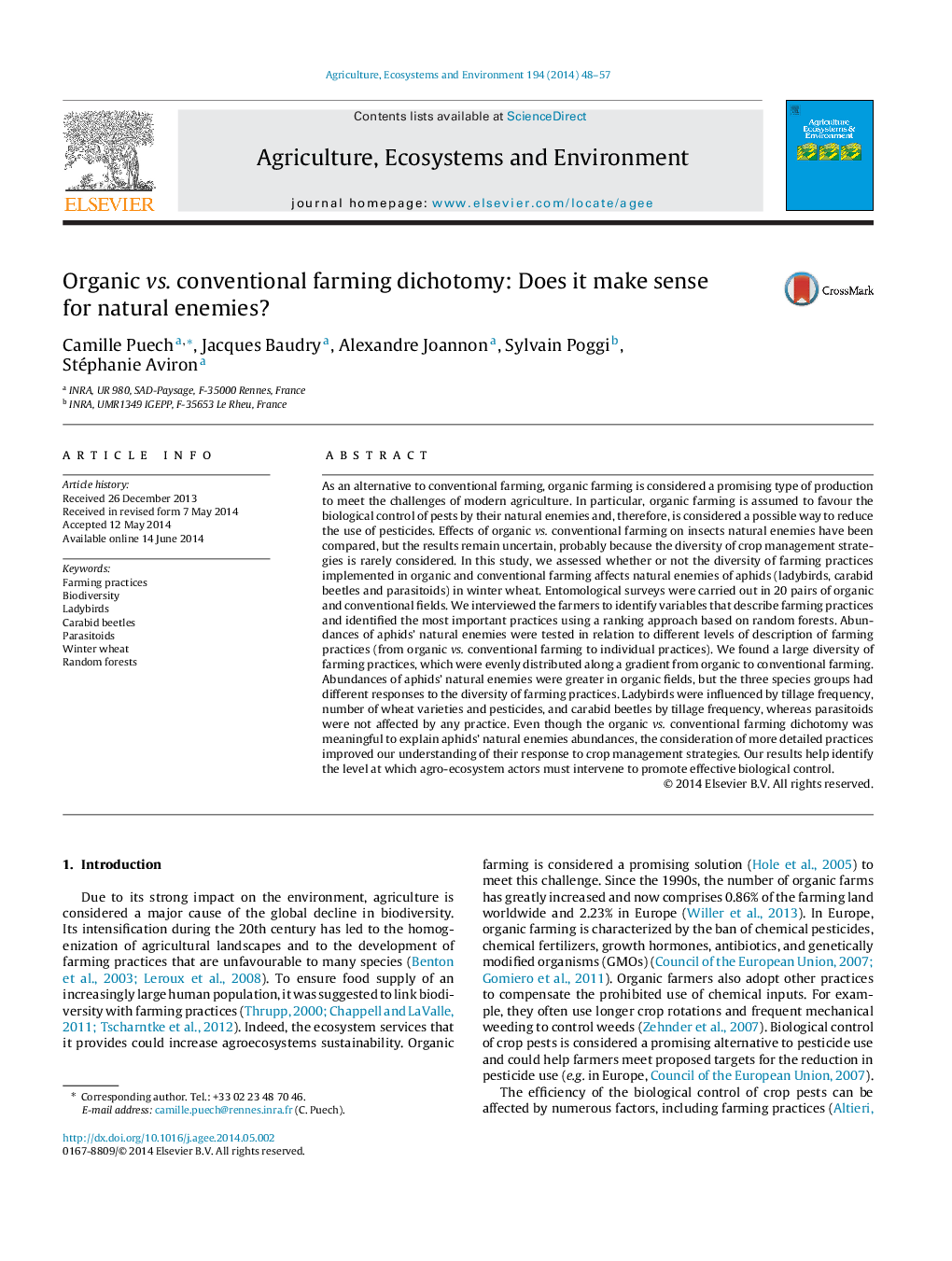| کد مقاله | کد نشریه | سال انتشار | مقاله انگلیسی | نسخه تمام متن |
|---|---|---|---|---|
| 8487829 | 1552058 | 2014 | 10 صفحه PDF | دانلود رایگان |
عنوان انگلیسی مقاله ISI
Organic vs. conventional farming dichotomy: Does it make sense for natural enemies?
ترجمه فارسی عنوان
ارگانیک در مقابل دوگانگی کشاورزی معمولی: آیا برای دشمنان طبیعی حساس است؟
دانلود مقاله + سفارش ترجمه
دانلود مقاله ISI انگلیسی
رایگان برای ایرانیان
کلمات کلیدی
ترجمه چکیده
کشاورزی به عنوان یک جایگزین برای کشاورزی متعارف، نوعی تولید امیدبخش برای مقابله با چالش های کشاورزی مدرن محسوب می شود. به طور خاص، کشاورزی ارگانیک به نفع کنترل بیولوژیکی آفات توسط دشمنان طبیعی آنها است و به همین دلیل راه حلی برای کاهش استفاده از آفت کش ها محسوب می شود. اثرات آلی و کشاورزی متعارف بر روی دشمنان طبیعی حشرات مقایسه شده، اما نتایج آن هنوز مشخص نیست، زیرا تنوع استراتژی های مدیریت محصول به ندرت مورد توجه است. در این مطالعه، ما بررسی کردیم که آیا تنوع عملیات کشاورزی که در کشاورزی ارگانیک و متعارف اجرا می شود، در دشمنان طبیعی شته ها (لیدی باندها، سوسک کاربید و پارازیتوئید) در گندم زمستانه تاثیر می گذارد. در 20 جفت مزارع آلی و متعارف انجام شد. ما با کشاورزان مصاحبه کردیم تا متغیرهایی را که شیوه های کشاورزی را توصیف می کنند شناسایی کرده و مهم ترین شیوه ها را با استفاده از رویکرد رتبه بندی مبتنی بر جنگل های تصادفی شناسایی کنیم. فراوانی دشمنان طبیعی شته ها در رابطه با سطوح مختلف توصیف روش های کشاورزی (از آلی و کشاورزی معمولی تا شیوه های فردی) مورد آزمایش قرار گرفت. ما تنوع زیادی از شیوه های کشاورزی را کشف کردیم، که به طور یکنواخت در حوض آبی به کشاورزی معمولی توزیع می شد. فراوانی دشمنان طبیعی شته ها در حوزه های آلی بیشتر بود، اما گروه های سه گونه واکنش های مختلفی به تنوع شیوه های کشاورزی داشتند. لاروبرد ها تحت تأثیر فرکانس خاکورزی، تعداد گندم و سموم دفع آفات و سوسک های کاربید با فرکانس خاکورزی قرار گرفتند، در حالیکه پارازیتوئیدها تحت تاثیر هیچ عملی قرار نگرفتند. با وجود اینکه دوگانگی ارگانیک و کشاورزی متعارف به معنای فراوانی دشمنان طبیعی شته ها بود، توجه به شیوه های دقیق تر، درک ما از پاسخ آنها به استراتژی های مدیریت محصول را بهبود بخشید. نتایج ما به شناسایی سطح که در آن اکوسیستم های اکوسیستم کشاورزی باید مداخله برای ترویج کنترل بیولوژیکی موثر باشد.
موضوعات مرتبط
علوم زیستی و بیوفناوری
علوم کشاورزی و بیولوژیک
علوم زراعت و اصلاح نباتات
چکیده انگلیسی
As an alternative to conventional farming, organic farming is considered a promising type of production to meet the challenges of modern agriculture. In particular, organic farming is assumed to favour the biological control of pests by their natural enemies and, therefore, is considered a possible way to reduce the use of pesticides. Effects of organic vs. conventional farming on insects natural enemies have been compared, but the results remain uncertain, probably because the diversity of crop management strategies is rarely considered. In this study, we assessed whether or not the diversity of farming practices implemented in organic and conventional farming affects natural enemies of aphids (ladybirds, carabid beetles and parasitoids) in winter wheat. Entomological surveys were carried out in 20 pairs of organic and conventional fields. We interviewed the farmers to identify variables that describe farming practices and identified the most important practices using a ranking approach based on random forests. Abundances of aphids' natural enemies were tested in relation to different levels of description of farming practices (from organic vs. conventional farming to individual practices). We found a large diversity of farming practices, which were evenly distributed along a gradient from organic to conventional farming. Abundances of aphids' natural enemies were greater in organic fields, but the three species groups had different responses to the diversity of farming practices. Ladybirds were influenced by tillage frequency, number of wheat varieties and pesticides, and carabid beetles by tillage frequency, whereas parasitoids were not affected by any practice. Even though the organic vs. conventional farming dichotomy was meaningful to explain aphids' natural enemies abundances, the consideration of more detailed practices improved our understanding of their response to crop management strategies. Our results help identify the level at which agro-ecosystem actors must intervene to promote effective biological control.
ناشر
Database: Elsevier - ScienceDirect (ساینس دایرکت)
Journal: Agriculture, Ecosystems & Environment - Volume 194, 1 September 2014, Pages 48-57
Journal: Agriculture, Ecosystems & Environment - Volume 194, 1 September 2014, Pages 48-57
نویسندگان
Camille Puech, Jacques Baudry, Alexandre Joannon, Sylvain Poggi, Stéphanie Aviron,
